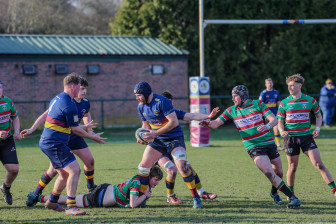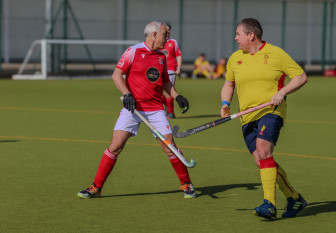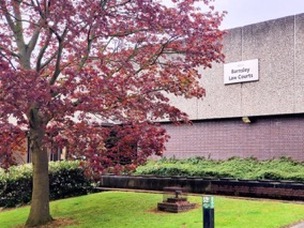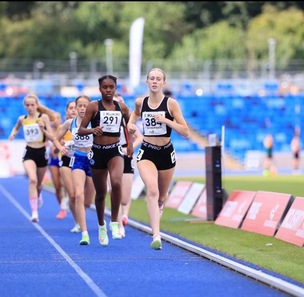Barnsley’s notoriety has been so bad - it’s filled two books!
Below is a tale from the second instalment in the series, More Foul Deeds and Suspicious Deaths in Barnsley, which is available to buy here…
This shocking story ended at the gallows and involved a woman and her alleged lover killing her husband in Wombwell way back in 1903.
There was also a lengthy manhunt to North Yorkshire for one of the accused.
You can read the full sordid tale below, just one of the stories featured in the book.
Lovers Gallagher and Swann and the Wombwell Murder
June 1903
By the late evening of Saturday 6 June 1903 the word murder was on almost everyone’s lips on the streets and in the taverns, inns and hotels throughout Wombwell, concerning a dreadful tragedy that had occurred earlier in the evening at a house in George Square (sometimes referred to as Alma Square), off George Street, situated in central Wombwell near the parish church, St Mary’s. It soon became known that forty-four-year-old William Swann, a glassblower at Aldham Glass Works, had been brutally killed, following an argument with his former lodger, John Gallagher, a labourer who worked at Mitchell Main. Tongues were also wagging about the relationship that existed between the dead man’s wife and his supposed killer. The house where the tragedy occurred was within a hundred yards of the police station, yet, it was, however, to be a good hour and a half after the occurrence, before the police were informed.
Those who knew more of the backgrounds leading to the tragic events expressed no great surprise, for it appeared that life in the Swann household was not a happy one, as Mrs Swann was addicted to drink and possessed a violent temper. She had spent time in gaol having been convicted of a serious assault on a woman. The couple had separated on several occasions and recently John Gallagher had come to lodge with them. However, on being suspicious of his lodger’s conduct towards his wife, William Swann had asked Gallagher to leave. Gallagher had then gone to a lodge nearby with widow, Mary Ann Ward. Rumour had it that following the attack on her husband, Emily Swann, who was in a drunken condition, remained in the house with her injured husband; and as neighbours were used to the occasional fracas at the Swann’s house, took no particular notice that anything seriously untoward had occurred, and as they were used to quarrels between William and Emily Swann, they considered it no business of theirs.
On this occasion, it appears that rumours were largely true. A little after eight o’clock Emily Swann seems to have realised that something was seriously wrong with her husband. She raised the alarm with neighbours and Dr Foley was sent for. bThe doctor was quick to arrive but it was clear to him after a short examination that Swann was dead and had been in that condition for about an hour. The police were sent for but owing to the drunken condition of the dead man’s wife, were able to learn very little about what had actually occurred. Nobody else in the immediate vicinity, who was interviewed by police, could throw any light on the subject. This gave Gallagher sufficient time to make his escape. Police Superintendent Quest was informed late on Saturday night of the events in Wombwell and at once made his way there. On Sunday morning, police in all parts of Yorkshire and some further afield were informed of Gallagher’s escape and a full description of the wanted man was given.
On the afternoon of Tuesday 9 June, an inquest was held before the coroner, Dossey Wightman, Esquire, at the Three Horseshoes Hotel, Wombwell. A large crowd had gathered outside the hotel and also in George Street, the greater portion of them being women. The assembling of the jury and their procession to view William Swann’s body gave the crowd the signal that the inquest was about to commence and there were stirrings around George Street in anticipation of the widow leaving the house to attend. Great interest was expressed in seeing her by many in the crowd. The crowd were not to be disappointed. Shortly before, on the afternoon of Tuesday 9 June, an inquest was held before the coroner, Dossey Wightman, Esquire, at the Three Horseshoes Hotel, Wombwell.
A large crowd had gathered outside the hotel and also in George Street, the greater portion of them being women. The assembling of the jury and their procession to view William Swann’s body gave the crowd the signal that the inquest was about to commence and there were stirrings around George Street in anticipation of the widow leaving the house to attend. Great interest was expressed in seeing her by many in the crowd. The crowd were not to be disappointed.
Shortly before the Coroner: What did you say?
Emily Swann: I never spoke.
Coroner: Well, what took place?
Emily Swann: My husband struck me on the eye.
Coroner: What after that?
Emily Swann: I got out of the house away from him, as soon as I could.
Coroner: You ran out of the house?
Emily Swann: Yes; I ran into Mrs Ward’s, who lives across.
Coroner: What then?
Emily Swann: I said to Mrs Ward, “Look at my eye.” John Gallager was in Mrs Ward’s.
Coroner: You showed him your eye?
Emily Swann: I did not speak to him. I was showing Mrs Ward my eye. Gallagher said he would give it him, and ran out of the house.
Coroner: You followed him?
Emily Swann: Yes, and I told him it had nothing to do with him and he hadn’t to go in. When he got in he struck him and started punching him.
Coroner: Were they in the street then?
Emily Swann: No, sir. My husband was in his own house.
Coroner: Struck him where?
Emily Swann: Struck him somewhere about the back of the neck, and then started punching him.
Coroner: Did he knock him down?
Emily Swann: Yes. He had him down and I tried to pull him off.
Coroner: Where did he punch him?
Emily Swann: Somewhere on his shoulders and on his head.
Coroner: Once or many times?
Emily Swann: It was a good many times, and when I tried to get my husband up he [Gallagher] struck me on the chin, and knocked me down.
Coroner: Did you try to get Gallagher away from him?
Emily Swann: I tried to pull Gallagher off, and he struck me.
Mrs Swann then went on to describe how Gallagher’s blow had felled her, she added that as she got up Gallagher was striking her husband with a wooden armchair. The chair was produced and Mrs Swann demonstrated by lifting the chair bodily and striking downwards with the legs to show what position the chair was in. She said she thought Gallagher struck her husband with the chair legs more than once and afterwards banged the chair on top of the fender and then calling her husband a ‘———- bastard’, with those words left the house.
Coroner: Did you go after him?
Emily Swann: No. I lifted my husband into a chair and tried to give him some water, but he sluttered down out of the chair whilst drinking the water. I went to Mrs Ward’s and I told her I thought Gallagher had very nearly killed my husband. She said she would not have anything to do with the matter. Gallagher was standing in front of Mr Beard’s door. I said to Gallagher, “You have killed him; he is dying.” Gallagher made some reply, but I could not tell what he said.
Coroner: Have you seen him since then?
Emily Swann: No, sir.
Mrs Swann was then questioned by Superintendent Quest. During questioning she said that her husband had left home on Saturday morning at nine o’clock. When he returned home he was quite sober, as she was herself. When asked if she had had anything to drink that day she replied that she had a gill of beer. After again declaring that she was sober, she then added: I was baffled because I was frightened.
Following further questioning Mrs Swann said Gallagher lodged at the house for five weeks up to a month ago. Her husband told him to leave but she did not hear him give a reason for this.
Coroner: You know what it was about?
Superintendent:Did your husband tell him to leave because of improper conduct? Was he jealous because of intimacy between you and him?
Emily Swann: Yes.
Superintendent: Did Gallagher afterwards come to your house?
Emily Swann: Yes.
Superintendent: Notwithstanding your husband had told him to go away? Had he been on previous occasions when your husband was out?
Emily Swann: Yes, once or twice, and also when my husband was in.
Superintendent: Have you ever heard Gallagher threaten your husband?
Emily Swann: Yes.
Superintendent: What has he said?
Emily Swann: He said he would make him ready for a coffin.
Superintendent: When did he say that?
Emily Swann: Several times, he has told him so to his face.
When asked why Gallagher had called at the house on Saturday, Mrs Swann said that he had called to collect some papers he had left there and also a pawn ticket. When she was asked what she knew about these papers Mrs Swann said she Was he jealous because of intimacy between you and him?
Emily Swann: Yes.
Superintendent: Did Gallagher afterwards come to your house?
Emily Swann: Yes.
Superintendent: Notwithstanding your husband had told him to go away? Had he been on previous occasions when your husband was out?
Emily Swann: Yes, once or twice, and also when my husband was in.
Superintendent: Have you ever heard Gallagher threaten your husband?
Emily Swann: Yes.
Superintendent: What has he said?
Emily Swann: He said he would make him ready for a coffin.
Superintendent: When did he say that?
Emily Swann: Several times, he has told him so to his face.
When asked why Gallagher had called at the house on Saturday, Mrs Swann said that he had called to collect some papers he had left there and also a pawn ticket. When she was asked what she knew about these papers Mrs Swann said she did not know he had left them, but when he came downstairs he had them in his hand. Superintendent Quest then turned to the events following her husband having arrived home and having seen Gallagher coming down the stairs. He asked Mrs Swann if, when her husband had accused her of also being upstairs with Gallagher for an improper purpose; and if Gallagher had made any comment. Mrs Swann said that Gallagher had said something but she hadn’t registered exactly what as her husband was talking at the same time. She also said that she did not particularly show Gallagher her eye, but he could see the injury her husband had inflicted on her. She said she could not get any help to her husband until the second time she went to Mrs Ward’s, and her husband was
then laid with his head against the cupboard door.
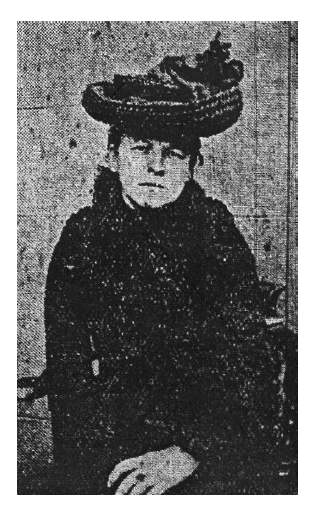
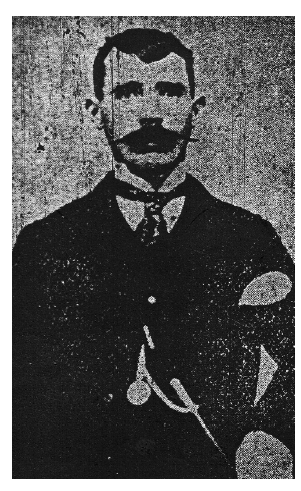
There was only her six-year-old son and herself in the house part of the time when Gallagher was kicking her husband. She said she could not send for the doctor to attend to her husband until she had got somebody into the house and she did not know that Dr Foley was passing the house at the time. Foreman of the jury, John Robinson, asked if it was in the past fortnight that Gallagher had made the threats against William Swann and the Coroner was able ascertain that these threats had first been made, following Gallagher having been asked to leave the house. Dr George Ernest Atkins, of Wombwell, who made a postmortem examination of the body said there were several bruises on the right temple and cheek bone, the neck, and upper part of the chest, shoulders, arms, and middle of the back. The covering of the brain was congested on both sides in the region of the temples, and the surface of the brain was also congested. On either side of the brain he found clots of blood. Death was due to effusion of blood into the substance of the brain, the injury being caused by violence. The breast bone was fractured, and the fourth, fifth, sixth and seventh ribs were also fractured on the right side.
In all, Dr Atkins said he found about twenty bruises on the body, and great violence must have been used to cause them. Widow Mary Ann Ward, said she lived opposite the Swanns, in the same square. Mrs Ward said that on Saturday when the tragedy occurred she had been drinking and was by no means sober. She added that Gallagher had also been drinking. In the afternoon Gallagher came to her house and sent her daughter to fetch his jacket and waistcoat out of pawn. Mrs Swann came to the house and took Gallagher’s things to her house, although she was not sure of the exact time this occurred. Gallagher went out after her and brought his things back. Gallagher was away just a few minutes and when he returned he said he would go and get washed.
Shortly afterwards Mrs Swann came in and showed Gallagher her black eye. Mrs Ward said when Gallagher had asked who had done it, she replied, ‘Mrs Swann’s husband.’ That was not long after Gallagher had come back. Mrs Swann had fetched Gallagher twice. After this Mrs Ward’s evidence became a little hazy and she kept contradicting himself. A protracted tale of what was said and what was not then ensued until the coroner said:
Are you sure Mrs Swann asked him to come to her and give her husband something or do something to her husband?
Mary Ann Ward: It was something of that sort.
Coroner: Do you mean it or not? Did Mrs Swann ask Gallagher to come with her to give her husband or do something to her husband?
Mary Ann Ward: I can’t remember. I do not remember whether she did or not. I know she fetched him twice.
Mrs Ward went on to say that she did not see Gallagher do anything and did not hear anything. Until Gallagher had gone she was not aware of the row that had taken place and of Gallagher having done anything to William Swann. She afterwards saw the deceased laid out on the floor at his house. She said she later saw Gallagher at the Royal Oak Inn. During questioning by Superintendent Quest, Mrs Ward said that Gallagher was at her house most of Saturday afternoon and that Mrs Swann was quite sober. After Gallagher had been told that Swann was dead she had met him in the street but she did not know at what time. Gallagher asked her if she would have a drink with him and she went with him to Pashley’s (Royal Oak Inn). She said the silly drink was in her head and she wished it had been far enough. During the time they were drinking at the Royal Oak Inn Gallagher never referred to the quarrel between himself and the deceased. She said she knew of quarrels having occurred before, she also knew Swann had been jealous and she knew Swann had ordered Gallagher to leave the house two or three times since Gallagher had given over lodging there. Only on Thursday Swann ordered Gallagher out of the house, who said he should only go for a better man. The husband threw a pot at his wife, which partly struck her. She knew Gallagher and Mrs Swann were together again that night. She had heard Gallagher say he would kill the bastard before he had done with him. When she told Gallagher that Swann was dead, he said something but she could not remember exactly what it was. It was something about serves him right, and he would give him some more to go to his grave with.
Another witness, pony driver Walt Wigglesworth, said he was a mate of Mrs Ward’s son and was in Mrs Ward’s house on Saturday afternoon, when Gallagher and Mrs Swann were having a drink together. They left the house together and about twenty minutes later Gallagher returned. When Mrs Swann returned, she had an injury to her eye and she said to Gallagher: Look Johnny what our Bill has done. Mr Wigglesworth said: Gallagher went straight out followed by Mrs Swann who said, ‘I hope he will punch him to death.’
Mr Wigglesworth remained at Mrs Ward’s house and Gallagher returned about fifteen minutes later. He had some blood on his face. Gallagher said he had smashed him four ribs and he would smash the others before he went to Bradford that night. Gallagher then went to get washed. At about eight o’clock Mrs Swann came to the house and asked Mrs Ward if she would go and have a look at her husband as she was sure he was dead. Mr Wigglesworth said Mrs Ward didn’t want to go but her son went instead. Later, Mr Wigglesworth saw Gallagher in the street and concerning Swann’s death he heard Gallagher say: I don’t care. Gallagher then proceeded to laugh and he started dancing and said he was not guilty. Mr Wigglesworth concluded his evidence by saying he knew nothing of the relationship between Gallagher and Mrs Swann, but he had heard of them going together.
Mr Wightman, in summing up said: You have to decide how the man came to his death, and I think the medical evidence will satisfy you. Then you must decide if some person caused death and you must say whom. It is either murder or not. If the charge is to be reduced to manslaughter, this is not the place to do that. I cannot but express my doubts as to the reliability of the evidence proffered by Mrs Swann and Mrs Ward but it will still give you material to arrive at the point. If you believe Gallagher caused the man’s death and I do not think you will have much difficulty with regard to that matter, it is your duty to send him for trial. After a few minutes deliberation the jury returned a verdict of ‘wilful murder’ against John Gallagher. The foreman added that the jury wished to call attention to the fact that if Gallagher heard the remarks of Mrs Swann that she hoped he would punch her husband to death, whether the coroner should not consider her to some extent guilty in some shape or other.
Mr Wightman said that it was not a question for them to deal with. He was told, and not by the police, there was a considerable opinion in Wombwell that of the two, Mrs Swann and Gallagher, there was not a very great deal to pick between them. Still, that question was not before them. Nevertheless, the foreman of the jury desired it should be heard and Superintendent Quest said they would pay due attention to the point. For the purposes of the inquest the coroner recorded a verdict of wilful murder against John Gallagher. The proceedings having been concluded it was now necessary for Mrs Swann to return home. The crowd had steadfastly refused to disperse and had stood their ground. It was necessary for Mrs Swann’s return home for the police to form an escort. As she left the hotel Mrs Swann was faced with loud jeering and hooting. However, the crowd restrained themselves and her police escort managed to get her home safely and the crowd on being satisfied they had made their feelings known, soon dispersed.
On Wednesday 10 June, the day of the murdered man’s funeral, a crowd of several thousand people had gathered in the vicinity of Alma Square and George Street. Pockets of enraged citizens expressed their disapproval of the deceased man’s widow, uttering threats of violence if she dared to show her head outside the door. Police Inspector Drury and Sergeant Minty were present with a strong force of constables. Among the crowd were many residents of Longcar, where Mrs Swann’s mother was a resident. When the family mourners came out of the house there was a heavy swell as the multitude of onlookers clamoured to get a better look, hoping to see Mrs Swann, but she did not appear. It was later learned that police had persuaded the widow not to attend her husband’s funeral. As the coffin was placed in a hearse to convey it to Wombwell Cemetery, the mourners followed on foot. The hearse was preceded by a contingent of workmen from the Aldham Glass Bottle Works, carrying what newspaper reports described as a beautiful wreath. The bearers were Messrs F Heppenstall, J Matthews, R Needham, J Chappel, J Goodwin, James Levitt, F Dale and J Oakland, all fellow workmen of the deceased. Mr Alfred Lightowler, manager of the works, was also present.
Mr Wightman said that it was not a question for them to deal with. He was told, and not by the police, there was a considerable opinion in Wombwell that of the two, Mrs Swann and Gallagher, there was not a very great deal to pick between them. Still, that question was not before them. Nevertheless, the foreman of the jury desired it should be heard and Superintendent Quest said they would pay due attention to the point. For the purposes of the inquest the coroner recorded a verdict of wilful murder against John Gallagher. The proceedings having been concluded it was now necessary for Mrs Swann to return home. The crowd had steadfastly refused to disperse and had stood their ground. It was necessary for Mrs Swann’s return home for the police to form an escort. As she left the hotel Mrs Swann was faced with loud jeering and hooting. However, the crowd restrained themselves and her police escort managed to get her home safely and the crowd on being satisfied they had made their feelings known, soon dispersed.
On Wednesday 10 June, the day of the murdered man’s funeral, a crowd of several thousand people had gathered in the vicinity of Alma Square and George Street. Pockets of enraged citizens expressed their disapproval of the deceased man’s widow, uttering threats of violence if she dared to show her head outside the door. Police Inspector Drury and Sergeant Minty were present with a strong force of constables. Among the crowd were many residents of Longcar, where Mrs Swann’s mother was a resident. When the family mourners came out of the house there was a heavy swell as the multitude of onlookers clamoured to get a better look, hoping to see Mrs Swann, but she did not appear. It was later learned that police had persuaded the widow not to attend her husband’s funeral. As the coffin was placed in a hearse to convey it to Wombwell Cemetery, the mourners followed on foot. The hearse was preceded by a contingent of workmen from the Aldham Glass Bottle Works, carrying what newspaper reports described as a beautiful wreath. The bearers were Messrs F Heppenstall, J Matthews, R Needham, J Chappel, J Goodwin, James Levitt, F Dale and J Oakland, all fellow workmen of the deceased. Mr Alfred Lightowler, manager of the works, was also present.
The service was conducted by the Rev R B Blakeney and only the relatives of the deceased were allowed inside the cemetery gates during the short service and internment. Family mourners comprised Mr Charles H Swann and Master Ernest Swann (sons of the deceased), Miss Helena Swann, Miss Annie Swann and Miss Swann (daughters of the deceased), Mr Alec Swann, Mr Tom Swann and Mr George Swann, of Stairfoot, all brothers of the deceased, and their wives.
On Saturday 20 June, the Barnsley Independent after reporting that Gallagher was still at large went on to say: …It has been ascertained by the police that Gallagher, on the night of the tragedy, got away to Sheffield, and from there booked for Bradford on a midnight train but alighted at Manningham Station. Beyond that he has not been traced. In a lengthy article which involved a great deal of speculation as to Gallagher’s whereabouts, the newspaper went on to say: One of the most interesting incidents in connection with the affair is that Mrs Swann had prepared for a holiday on Friday last, but it is understood that immediately the police authorities were aware of her movements, they intervened, and Mrs Swann is still at home, going about in the ordinary manner. The children have been taken by members of the family to Barnsley and Bradford, the widow, therefore, living alone. Towards the end of the article, which had clearly been typeset during the course of the week it stated:
…It has since transpired that Mrs Swann has left the house occupied by her at the time of the tragedy, and is now living with an old widow lady in the same street, a few doors higher up. Early on the morning of Tuesday 4 August, Barnsley West Riding police authorities announced that John Gallagher, who was wanted on a coroner’s warrant charged with the wilful murder of William Swann, glassblower, of Wombwell, on 6 June, had that morning been run to earth at Middlesbrough.
In Wombwell the first intimation to the local public of the news of Gallagher’s arrest came when a telegram was posted in the window of Mr Lodge, newsagent. Wombwell police, however, knew of Gallagher’s arrest a good hour before and Police Sergeant Playfoot was already on his way to Barnsley in anticipation of his proceeding to Middlesborough to take Gallagher in his charge from the Middlesbrough Police. When Mrs Swann was told by police of Gallagher’s arrest, she became very excited and talked in a rambling manner appeared to be very nervous. Mrs Swann kept a low profile for the remainder of the day and remained in a contemplative mood until police arrested her at midnight. She was conveyed to Barnsley by the 5.41am train. Gallagher, who had since his escape from Wombwell taken to the open road had arrived at his sister’s house in Middlesborough in the company of another tramp, Gallagher being the worse for drink. Information soon reached the ears of the police and Gallagher’s arrest was speedily effected. Gallagher was brought back toBarnsley in the company of Police Superintendent Quest and Sergeant Playfoot. Since his departure from Wombwell via Sheffield, Gallagher had managed to find work by which he had survived, although he was very much worse for wear, having shaved very little and being severely weather-beaten. During his eight weeks on the road Gallagher had been in Manchester, Leeds, Bradford and finally, Harrogate, from where he had walked to Middlesbrough. Great interest was expressed by the public when Gallagher made his first appearance at Barnsley West Riding Police Court on Wednesday morning. Even greater interest was shown when it was learned that Mrs Swann had also been arrested. Police presence in Westgate was strong to ensure public order was kept. When the public were allowed into the building the courtroom was soon filled to capacity. The Bench comprised Messrs C Brady (Chairman), W Jackson, W A Durnford, M Gill, J T Field, W Washington and H Gamwell. Gallagher was described on the Court Sheet as John Gallagher, labourer, of no fixed abode, but who formerly resided in Milton Square, George Street, Wombwell. Gallagher was charged on a coroner’s warrant with wilful murder etc. The name of Emily Swann also appeared on the list and the charge that appeared opposite her name was also that of wilful murder. Gallagher stepped smartly into the dock, Mrs Swann followed him in a shuffling manner. The proceedings were brief. Gallagher was wearing a shabby grey suit and had a scarf around his neck and watched the proceedings in a nervous manner. Those in the Court who knew him well could see that his time on the road had reduced his weight by a good two stones. Mrs Swann, dressed in black and wearing a hat, looked stern as she paid deep attention to the proceedings.
As soon as Gallagher and Swann were in the dock together, Superintendent Quest said that he thought he would be able to prove that, on the night of 6 June last, a brutal murder was committed in Swann’s house. Superintendent Quest went on to say:
The two prisoners were drinking together during the greater part of the afternoon, they afterwards went into the deceased’s man’s house and I think I shall be able to prove that the man Gallagher kicked Swann in such a manner that he died, and that Emil Swann encouraged him in so doing. Towards the end of the proceedings, when Superintendent Quest, having requested that the prisoners be remanded until the following Wednesday, further asked that both prisoners be remanded to Wakefield, the whole Bench agreed without any hesitation. The prisoners were then removed from the courtroom. There was still a crowd outside the Court at two o’clock in the afternoon when a cab drew up outside in the customary fashion to take prisoners to Wakefield. To the dismay of the crowd the cab was not for Gallagher and Swan, who were eventually removed to the station by cab at 4.15pm. Both in Westgate and at the station the crowd remained, they were orderly but there was a hostile feeling. As the train had
not arrived at the station, Gallagher and Swann were kept out of reach of the crowd by placing them on the bridge (the same bridge that was taken down in recent years, and re-erected at Elsecar Heritage Centre). When the train drew up on the platform Gallagher and Swann were quickly placed in their carriage with a police escort and the blinds drawn to obscure them from view. As the train steamed out of the station and pulled slowly away from Barnsley, the crowd looked on with what the Barnsley Independent described as ‘a severe countenance’.
Early on the following Wednesday the prisoners were brought from Wakefield to appear before Barnsley magistrates, where they were again remanded. During the brief proceedings, Mr Rideal rose and said: In this case, your worships, I am instructed by the Treasury to prosecute the two prisoners on a charge of murder of the husband of the female prisoner. I am not ready at present to go on with the case, in which there are a large number of witnesses, some seventeen or eighteen… Mr Rideal said he thought it would be necessary for a special court should be held for the hearing. The prisoners were remanded to appear again at 10.00am the following Tuesday.
A crowd of about a hundred waited outside the court and as the prisoners were taken to the station where they were placed in the waiting room with a strong police guard, curious onlookers packed the platforms. There was very little to see and once the train arrived Gallagher and Swann were speedily transferred to a carriage and the blinds were once again drawn.
On Tuesday 18 August, at the hearing before Barnsley West Riding Magistrates, Mr Rideal called seventeen witnesses for the prosecution. Before the first witness was called, the Chairman, Charles Brady, Esquire, asked the prisoners: Does anyone defend you at all? Have you a lawyer? Gallagher, replying for both himself and Swann, simply said: No, sir. Mr Rideal then proceeded. One witness, a neighbour, living opposite the Swann’s house, described how on 11 May between 8.30pm and 9.00pm, just as he had returned from work he saw William Swann come home. Gallagher was in the kitchen. Just as Swann entered the door, his wife struck him and knocked him down. On hearing this, Mrs Swann called out from the dock: Oh, man alive. The witness went on to say that a fight ensued between Swann and his wife, and Gallagher interfered. He first of all struck Swann with his fist and then began kicking him. During this attack on Swann, the witness heard Mrs Swann call out: Kick the bastard to death. Kick the bloody swine. Kick him out of the way and I will help thee. Then the witness said that on the Friday night before the murder he heard Swann and his wife quarrelling.
Another witness, Lavinia Ward, wife of Arthur Ward of 29 Alma Street, Wombwell, said, a week before the murder she heard Gallagher say he would kill Swann before he went away. Mrs Ward added that she had also heard Mrs Swann tell Gallagher to kill her husband on several occasions. Police Sergeant Alfred John Minty, stationed at Wombwell, said on the night of William Swann’s death he accompanied Sergeant Playfoot to the Swann’s house. In the kitchen he found the body of the deceased lying on the floor with his head against the cupboard and a poker by his side. Mrs Swann and Mary Ann Ward were present but when he asked what had happened he could not get a satisfactory answer from either of them. Both women were very drunk. All Mrs Swann would say was:He isn’t dead is he? He can’t be dead.
The prosecution’s case against both prisoners was very strong. The prisoners had nothing to say in respect of the formal charge, and at the conclusion of the proceedings they were committed at Leeds Assizes, which were due to begin in October. As the two prisoners left the court Mrs Swann threw several kisses to her friends and relatives. Gallagher acknowledged no one. He didn’t even turn his head to take a look around the courtroom. The prisoners were then taken to Wakefield in the usual way. There they would be given an ordinary diet and no work would be expected of them. They would also be allowed proper exercise during their detention. On Monday 7 December John Gallagher and Emily Swann were brought into court at Leeds Town Hall at the Assizes to plead. Gallagher was placed in the dock and asked by Mr Justice Darling whether he was represented by counsel. When Gallagher answered in the negative, his Lordship, said to the Clerk that he understood the woman was represented and on being told that she was, his Lordship asked Gallagher if he would like to have counsel, to which Gallagher replied: I should, please, my Lord.
His Lordship then told Gallagher: I will see you are represented when the case is heard. Gallagher and Swann’s trial began on Wednesday 9 December. Mr E Tindall Atkinson, KC and Mr W J Waugh conducted the case for the prosecution. Gallagher was defended by Mr Mitchell Innes of Middle Temple, and Swann by Mr H Newell, of Bradford. The prisoners both stepped briskly into the dock. The Clerk announced: The prisoners are charged that they, on 6th June of the present year, at Wombwell, did feloniously, wilfully, by malice or forethought, did kill and murder William Swann. Then intimating to Gallagher, the Clerk said: Gallagher you have pleaded not guilty. Emily Swann, are you guilty of that charge or not! Then came the reply from Mrs Swann: Not guilty, my Lord.
In his opening speech for the prosecution, Mr Tindall Atkinson said that the prisoners were charged jointly with the murder of William Swann and if the evidence was well founded there was not the slightest doubt that this man met his death under circumstances of the grossest brutality. The trial continued until Friday. Damning evidence against the couple was presented. The history of the many fights between husband and wife, Gallagher’s involvement, the love affair that existed between Gallagher and Swann and the indiscreet utterances before numerous witnesses, where threats to kill William Swann had been made, seemed to leave little doubt that Gallagher and Swann had both conspired and intended to kill the man, whose murder for which they were both being now tried. Gallagher’s defence was based on his infatuation for Mrs Swann. Besotted by love and inflamed by passion and drink, good sense overtook him but he did not intend to commit murder. Mrs Swann’s defence was that although her actions were reprehensible and sinful, she intended nothing more than that her husband should receive a good thumping. The fact that Gallagher, shortly after his arrest had said that Mrs Swann had finished her husband off with the poker, seemed to have some credence, when one considers evidence proffered by several witnesses, that when he heard of William Swann’s death, Gallagher had laughed and danced and said in joyful tones: I haven’t bloody well done it.
One wonders, if subconsciously he had convinced himself that the injuries inflicted on William Swann by himself had not caused the man’s death, believing that his accomplice had in fact done the dirty deed. Gallagher’s comments regarding Swann having finished her husband off with the poker was not revealed to the jury until after they had delivered their verdict.
In any event, the evidence against the accused couple was so overwhelmingly strong, that it took them just half an hour to reach the verdict that both Gallagher and Swann were both guilty of wilful murder. Mr Justice Darling then passed sentence of death, but not before commenting that he had believed they had made the correct decision. Before their execution both Gallagher and Swann listened to the ministrations of clergymen. In the condemned cell, Mrs Swann dictated letters to her eighty-year-old mother and to her sisters, requesting them to love her daughters Eleanor and little Elsie and to give little Raymond a kiss. John Gallagher and Emily Swann were executed together at Leeds on 29 December 1903. As they mounted the scaffold Gallagher appeared momentarily startled as Swann said to him: Good morning, Johnny. He replied: Good morning love.
As Gallagher and Swann stood on the drop, executioner John Billington and his assistant quickly went about their business. Just as Billington pushed the lever, which withdrew the bolts and the drop fell, Mrs Swann uttered the words: Goodbye, God bless you. Then, Gallagher and Swann were despatched into eternity, as they plummeted to a quick and reportedly painless death. Later that morning, an inquest was held and afterwards the lovers, thirty-year-old John Gallagher and forty-two-year-old Emily Swann, suffered the indignity of being buried in quicklime lined graves, within Armley’s precincts.






